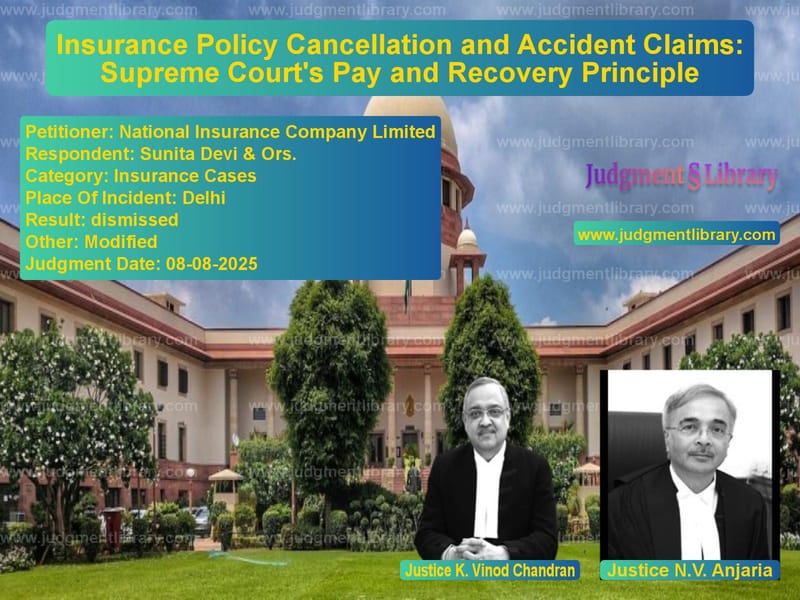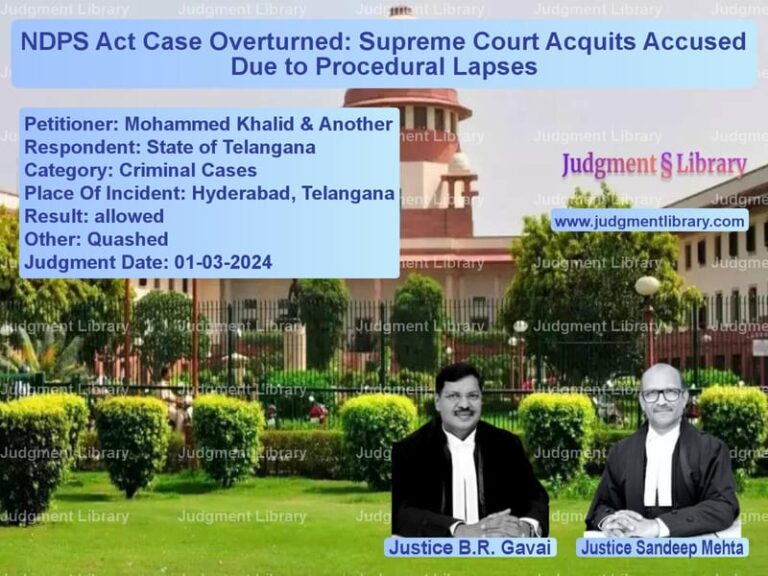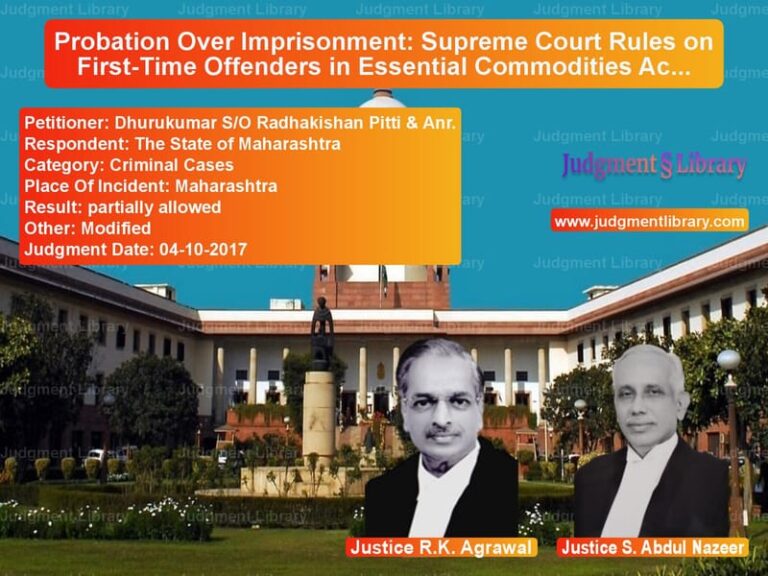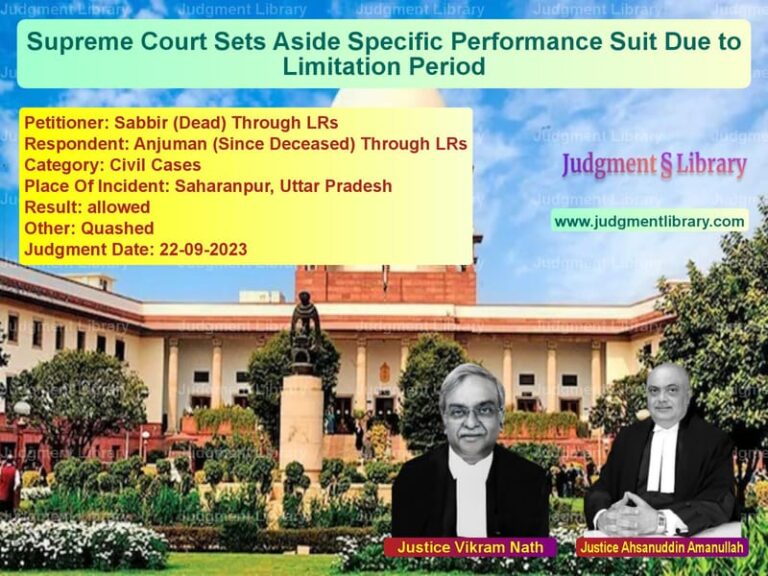Insurance Policy Cancellation and Accident Claims: Supreme Court’s Pay and Recovery Principle
In a significant ruling that clarifies the complex interplay between insurance policy cancellations and third-party rights, the Supreme Court of India has delivered a judgment that balances the legal rights of insurance companies with the practical need to protect accident victims. The case involved National Insurance Company Limited appealing against orders that required it to pay compensation for a fatal accident involving a truck whose insurance policy had been cancelled months before the incident occurred due to non-payment of premium.
The tragic incident that led to this legal battle occurred on August 22, 2005, around 3:30 PM, when Dheeraj Singh, a 36-year-old computer engineer, lost his life in a road accident. He was driving his motorcycle with a pillion rider when a speeding truck bearing registration number HR 46 A 1020 hit his vehicle from behind. The impact caused Singh to fall onto the road, where he was tragically run over by the same truck. The Motor Accident Claims Tribunal determined that the truck driver was solely responsible for the accident due to rash and negligent driving, and awarded a total compensation of ₹8,23,000 to Singh’s family, considering his age, profession, and monthly earnings of ₹3,364.
The Insurance Company’s Defence
The core of the insurance company’s defence, presented both before the Tribunal and the High Court, revolved around a crucial fact: the insurance policy for the offending vehicle had been cancelled well before the accident occurred. The company argued that “the policy of insurance issued in relation to the offending vehicle was cancelled by it, about which the owner and the Regional Transport Officer were informed. It was contended that as the policy stood cancelled and it did not subsist on the date of accident, the appellant-insurer could not have been fastened with the liability of payment of compensation.”
The evidence presented showed that the cheque issued for the insurance premium had bounced due to insufficient funds, and the insurance company had subsequently cancelled the policy. Witness testimony and documentary evidence established that the company had sent communications cancelling the insurance policy and had informed both the vehicle owner and the Regional Transport Officer about this cancellation. The Tribunal itself recorded that “the testimony of witness appellant-Insurance Company (R3W1) was not controverted and could not be demolished.”
Legal Arguments Presented
Before the Supreme Court, the appellant’s counsel, Mr. Amit Kumar Singh, built his case around established legal precedents. He relied heavily on National Insurance Company Ltd. vs. Seema Malhotra, arguing that “when the insured had failed to pay the premium promised and the cheque towards the premium returned dishonoured by the bank, the insurer was not liable to perform its part of promise.”
The counsel further strengthened his argument by citing two other important decisions: Deddappa & Ors. vs. Branch Manager, National Insurance Company Limited and United India Insurance Company Limited vs. Laxmamma & Ors. He submitted that “when the position was clearly obtained that the premium was not paid and the communication was sent in that regard to the concerned parties, the Tribunal and the High Court, both committed an error in directing the appellant-company to pay the amount of compensation to the claimants although to permit the appellant to subsequently recover from the owner. It was submitted that the Appellant-Insurance Company was required to be entirely exempted from the liability to deposit or pay.”
On the opposing side, the claimants’ advocate, Mr. Sudhir Naagar, defended the lower courts’ decisions, submitting that “the judgment and award by the Tribunal and upholding thereof by the High Court requiring payment of compensation to the claimants by the Insurance Company was just and proper and that such direction was in the nature of doing justice.” He also informed the Court that “the Insurance Company has already deposited 50% of the awarded compensation along with interest and that the claimants have withdrawn the same.”
The Supreme Court’s Legal Analysis
The Supreme Court delved into the legal principles established in the precedents cited by both parties. In analyzing Deddappa’s case, the Court noted that “this Court addressed very point interpretating the provisions of Section 147(5), 149(1) and 166 of the Motor Vehicles Act, 1988 in relation to the liability of the insurance company vis-à-vis the third party in the eventuality of rescindment of the insurance contract on account of non-payment of premium because of bouncing of the cheque issued towards premium amount.”
The Court observed that in Deddappa’s case, “this Court held that the contract of insurance stood rescinded due to failure of consideration and intimation to that effect given to the parties concerned. However, the Court in exercise of its jurisdiction under Article 142 of the Constitution, directed the insurance company to compensate the appellant and to recover amount from the vehicle owner.”
Similarly, in United India Insurance Company Limited’s case, the Court “laid down the very principle that the statutory liability of the insurer to indemnify the third parties would subsist unless the insurance policy was cancelled and the intimation of such cancelation had reached the insured before the accident. In this judgement also, this Court reiterated the ‘pay and recovery’ principle.”
Application to the Present Case
Examining the facts of the current case, the Court noted the significant timeline: “the accident took place on 22.08.2025. The cheque towards premium was dishonoured and intimation was given vide letter dated 04.05.2005. Therefore, there was a gap of more than three months from the date when the insurance policy was liable to be treated as cancelled and the date when the accident took place.”
The Court recognized that “even as this Court has underscored the proposition that cancellation of insurance policy issued in favour of the third party for covering third party risk, because of bouncing of cheque for premium or non-payment of premium, would in law, absolve the insurer from liability to pay the compensation, once the insurer has intimated the cancellation to the parties concerned, in the final directions issued, the Court thought it fit to direct the insurance company to make payment of compensation to the claimants and thereafter to permit it to recover the same.”
The Court’s Balanced Approach
Taking a practical and balanced approach, the Supreme Court considered that the insurance company had already deposited 50% of the compensation amount with interest, and the claimants had withdrawn this amount. The Court reasoned that “Depositing of the compensation amount by the Insurance Company as above could be well said to be conforming the law laid down by this Court in Deddappa (supra) and in United India Insurance Company (supra). The Insurance Company has deposited the 50% amount of compensation with interest as awarded, the same is also released and the respondent-claimants have received them, in larger interest of justice to all parties, no recovery deserves to be permitted for the said amount deposited and withdrawn from the claimants. It would be not only harsh but would amount to setting the clock back.”
The Final Judgment
In its concluding decision, the Court established a balanced solution: “In the totality of the operative facts, this Court is of the view that 50% amount which is already paid to the claimants need not be touched. Therefore, it is provided that there shall be no recovery from the claimants in respect of the said ½ part of compensation. The appellant – Insurance Company, however, shall be at liberty to recover the said 50% amount along with interest deposited by it as above and received by the claimants as above, from the owner of the offending vehicle in accordance with law. As far as the balance of 50% amount along with interest is concerned, which remains, the claimants shall be entitled to recover the same from the owner of the offending vehicle in accordance with law.”
This judgment represents a significant development in insurance law jurisprudence, particularly regarding the ‘pay and recovery’ principle. While acknowledging the insurance company’s legal position that a cancelled policy due to non-payment of premium absolves them of direct liability, the Court prioritized the protection of third-party accident victims who had no role in the policy cancellation. The decision demonstrates the judiciary’s ability to balance strict legal principles with equitable considerations, ensuring that technical insurance contract violations don’t leave accident victims without recourse. The ruling also serves as a reminder to vehicle owners about their responsibility to maintain valid insurance coverage and to insurance companies about their obligations to properly communicate policy cancellations to all relevant parties.
Petitioner Name: National Insurance Company Limited.Respondent Name: Sunita Devi & Ors..Judgment By: Justice K. Vinod Chandran, Justice N.V. Anjaria.Place Of Incident: Delhi.Judgment Date: 08-08-2025.Result: dismissed.
Don’t miss out on the full details! Download the complete judgment in PDF format below and gain valuable insights instantly!
Download Judgment: national-insurance-c-vs-sunita-devi-&-ors.-supreme-court-of-india-judgment-dated-08-08-2025.pdf
Directly Download Judgment: Directly download this Judgment
See all petitions in Motor Insurance Settlements
See all petitions in Third-Party Insurance
See all petitions in Insurance Settlements
See all petitions in Compensation Disputes
See all petitions in Road Accident Cases
See all petitions in Judgment by K. Vinod Chandran
See all petitions in Judgment by N.V. Anjaria
See all petitions in dismissed
See all petitions in Modified
See all petitions in supreme court of India judgments August 2025
See all petitions in 2025 judgments
See all posts in Insurance Cases Category
See all allowed petitions in Insurance Cases Category
See all Dismissed petitions in Insurance Cases Category
See all partially allowed petitions in Insurance Cases Category







